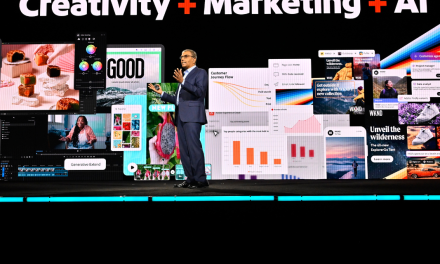Companies would do well to leverage latest technologies, such as AI, DDDM, omnichannel marketing and social listening, for better reach of their marketing campaigns and to satisfy their customers, says Locobuzz co-founder Vishal Agarwal.
Organisations strive to ensure that they provide the best experience for their users. It helps them stay several notches above their competition, and, of course, relevant to their user base. The best way to do so is by adopting the right technologies to help the brand keep up with the rapidly evolving requirements in the digital space.
With the scale of consumer engagement and the quantum of data on open platforms, it is impossible to create quality experiences without leveraging the right technology. In an exclusive chat with MartechAsia, Vishal Agarwal, Co-Founder and Chief Executive Officer of Locobuzz, shares his insights on how to leverage technologies for better reach of marketing campaigns. Locobuzz is a digital customer experience management platform that drives business transformation.

Marketing technology is the latest buzzword in the world of business, with a lot of core technologies being integrated into it. What’s your take on the emerging trends?
Around 2015, we witnessed a heightened opportunity to venture into data analytics and intelligence that stemmed from social media. There was a strong surge in social media and online engagement rates, which led to the establishment of our digital customer experience management technology platform.
When it comes to marketing technology, trends in customer experience management, technological advancements must work in sync with changing customer behaviour and evolving marketing trends. A lot of these core technologies must work together to unlock potential value for our customers. Analytics, Artificial Intelligence (AI), Big Data and automation are four pillars for a decent CX solution. Also, Machine Learning (ML) is critical to ensure expectations can be met at scale.
It’s amazing to see how different industries adopt and benefit from ML and AI in the space of big data analytics, competition benchmarking, online reputation management and of course, the glue that holds it all together – digital customer experience. Further we live in an age, where user behaviour and interests are changing very fast and brands need to play catch up.
Which stage is ideal for organisations to employ cutting-edge technology to drive their marketing initiatives?
The earlier the better. Social listening platforms, in particular, are ideal when a brand has a growing customer base online and wishes to be omnipresent on all social and digital channels. It is necessary that consumer-facing companies have an omnichannel presence as the consumer base begins to expand and expects to be able to reach the brand from where they are. Consumers are now engaging in active conversations with brands across digital platforms. This pattern is here to stay. Technologies like social listening platforms and social media management tools are critical to support the various customer engagement opportunities as well as marketing initiatives online. With the correct implementations of modern AI, brands can provide consistent omnichannel experiences for increased customer satisfaction, and sustain a healthy brand awareness output.
One should remain connected to customers in real-time and understand their preferences in detail. Social listening is integral in the provision of real-time data insights that help brands deliver unique and personalised experiences for customers. This results in tangible differentiation between the brand and its competitors. Thus, it is safe to say technology should be adopted right from the inception of a company or the launch of a brand.
Can marketing technologies be accessed by all kinds of businesses – from newly minted start-ups, MSMEs to large enterprises?
Companies are working very hard towards making marketing technologies available to all. The notion that technologies have been the fiefdom of large enterprises because of costs or ‘complicity in nature’ is flawed. For example, we offer world-class technology to smaller businesses at a very reasonable cost. Instead of spending $2 million annually, brands can get the same access to AI technology at $500 a month, and the price should be a function of usage.
We make technology accessible by equating costs to user licenses and number of users, and do not equate costs to novelty features that would cost an arm and a leg. Marketing technologies should be accessible by all businesses and that every business should rightfully. We help brands to create smart customer journeys, wherein if a customer were to reach out over WhatsApp, the brand would automatically send an email to address their concerns or queries.
This is ideal for brands that operate on a fixed budget and have a set goal for customer outreach and brand awareness activities. Technology gives the brand the exact result of its outreach plan that allows it to test the waters even before starting any outreach activities. AI plays a huge role in the reduction of manual effort for figuring out which aspects, channels, budgets, et al., effectively target the marketing goal. All of this is calculated, executed and concluded by AI and data analytics.
How does technology usage in marketing enable quick decision-making and improve the efficiency of campaigns and initiatives?
The world today produces such large volumes of data that it is possible for every individual brand to draw relevant insights that represent very real ground realities. Data-driven insights are now what help brands stay at the forefront of not just their competition, but also become a better version of themselves for customers every single day.
Modern AI and ML models enable deeper understanding of the digital atmosphere and lead brands to driving effective and strategic business decisions that lead to very high value returns. Right from personalising products and services, to scaling of business models to match the right buyers to sellers, data analytics has changed the way businesses make fact-based decisions.
Through AI, sentiment analytics and brand listening, we could study the perception and reception of an automotive brand that launched a new vehicle targeted towards men of a certain age group. While monitoring the launch online, the brand noticed that the highest numbers of cars were, in fact, purchased by women. The results of social listening were so powerful, that the brand decided to retract the campaign, and repositioned the car as a woman-centric product, therefore establishing a perfect relationship with its customers and absolute success.
Research shows that DDDM (data-driven decision-making) from the core of modern AI technology has resulted in overall higher operational efficiency, improved customer satisfaction, and robust profit and revenue levels. Hence, with the right use of technology, it enables organisations to make quicker and better-learnt decisions.
What is the future of marketing technology, especially in the Indian context?
Marketing technology has a very universal role to play, whether in India or other parts of the world, as businesses from marketing have a very similar expectation. Return on Investment (ROI) is something on everyone’s mind and brand awareness is a factor that all companies want to measure accurately. The future of marketing technology depends on solutions that provide businesses with a very clear-cut, measurable result of what a brand’s marketing efforts are.
If a marketing activity is for customer acquisition or, say, customer satisfaction, then technologies will fulfil these activities. They will also show the brand how well the strategy and execution was performed in terms of number of customers, deep customer personality insights, and engagement patterns, et al., depending on the metrics.
As opposed to instructing technology to post or schedule communications on various individual social media channels, or manually respond to queries and complaints, the idea of modern marketing technology will be to evaluate patterns for brands and drive communications based on its analysis using AI.



















